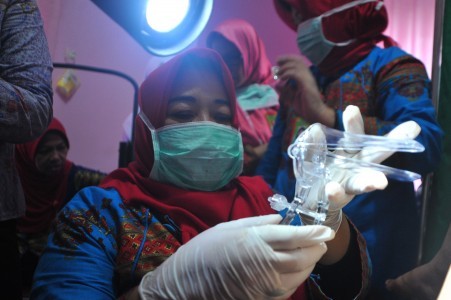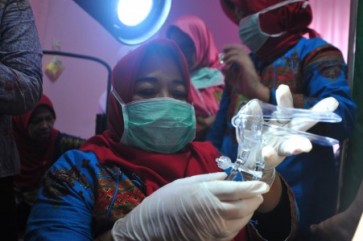Popular Reads
Top Results
Can't find what you're looking for?
View all search resultsPopular Reads
Top Results
Can't find what you're looking for?
View all search resultsHPV vaccine rollout: New hope in fight against cervical cancer
The government's plan to roll out the HPV vaccine as part of the national childhood innoculation program is a big step toward a world free of preventable cancers.
Change text size
Gift Premium Articles
to Anyone
G
ood news for Indonesian women and girls: Health Minister Budi Gunadi Sadikin recently announced that the government would incorporate the human papillomavirus (HPV) vaccine into the school-based national immunization program (BIAS), with 5 million covered annually under the scheme. Without this, a woman would have to spend between Rp 1 million (US$69) and Rp 4 million for the complete HPV vaccine regimen.
The HPV vaccine is a game-changer in the war against cervical cancer, the second leading cause of death in women globally. Nevertheless, concerns regarding the program loom among the general public.
More than 95 percent of cervical cancer is caused by persistent HPV infection. The virus transmits mainly through sexual contact and infects both women and men. Besides cervical cancer, it also manifests as anogenital warts, anogenital cancers and oral cancer.
Although widely known as a “cancer vaccine”, the HPV vaccine does not directly prevent cervical cancer but rather, the predisposing HPV infection. It contains inactive particles of the viral antigen of high-risk strains (16 and 18) that account for 70 percent of all cervical cancer cases.
There are two types of vaccine available in Indonesia: the bivalent Cervarix, which covers types 16 and 18, and the quadrivalent Gardasil, which includes two additional strains that cause warts (6 and 11). A complete regimen requires two doses for adolescents aged 9-14 and three doses for those aged 15 and older.
The vaccine has robust evidence of efficacy. It offers a significant protection of 88-95 percent against infection and 92-100 percent against disease. The United Kingdom initiated a national HPV vaccination scheme in 2008 and found that vaccinated girls aged 12-13 had 87 percent less cervical cancer than their unvaccinated cohorts.
No major safety concerns have been raised. Pain in the injection area due to the amount of aluminum adjuvant is the most common side effect. There is no evidence the vaccine affects fertility or the menstrual cycle. In addition, the HPV vaccine’s manufacturing process does not use pork-derived gelatine and therefore, should easily be accepted by Muslims.



















